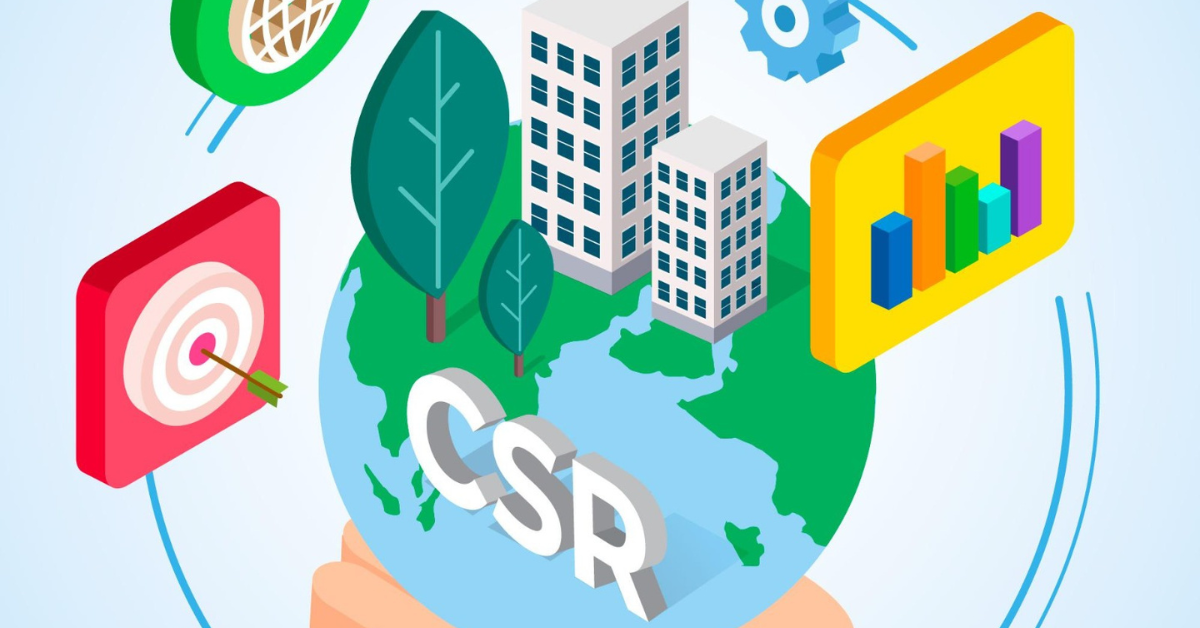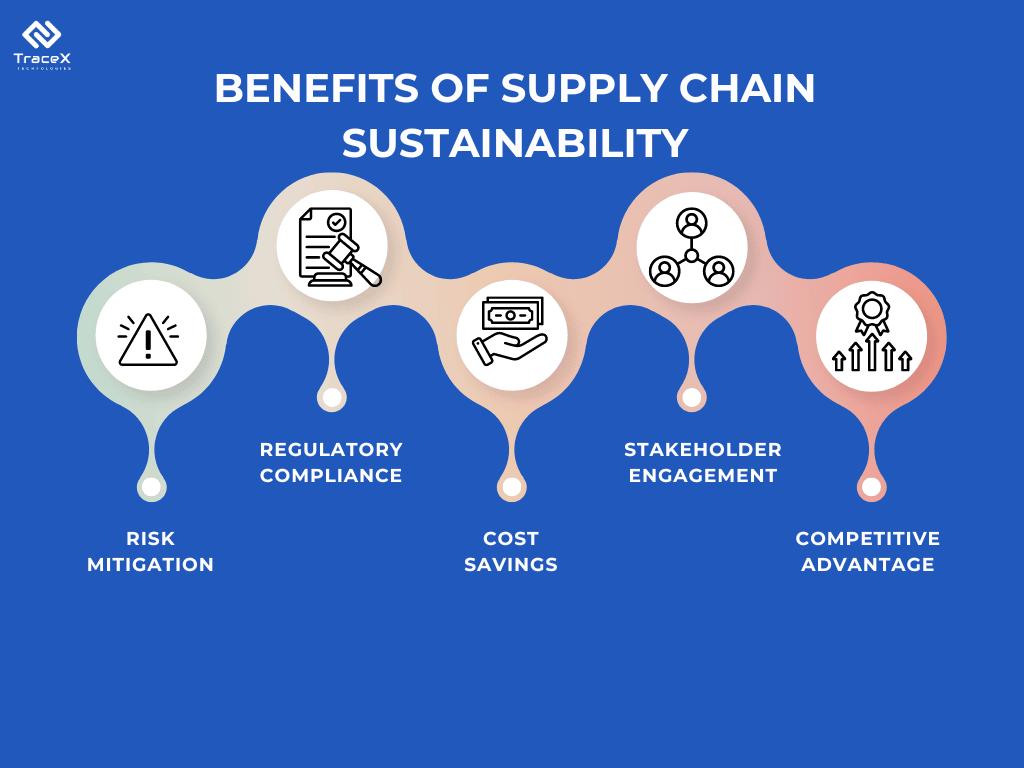Contact: +91 99725 24322 |
Menu
Menu
Quick summary: Unlock the power of supply chain sustainability and discover why it has become a norm for organizations. Explore the key strategies, benefits, and best practices to build a sustainable supply chain. Enhance your environmental and social performance while driving business growth. Read our blog to learn more about achieving supply chain sustainability.

Companies are under increasing pressure from consumers, regulators, and stakeholders to ensure that their supply chains are environmentally responsible and ethically sound. Supply chain sustainability has become the cornerstone of corporate responsibility. Yet, many organizations struggle with the complexity of integrating sustainability into every link of their supply chain. The challenge lies not only in meeting stringent standards but also in maintaining profitability while doing so. As businesses grapple with these demands, the need for a sustainable, transparent supply chain has never been more critical.
According to CDP, companies with sustainable supply chains are 55% more likely to attract environmentally conscious consumers.
From ethical sourcing and responsible manufacturing to carbon footprint reduction and waste management, supply chain sustainability encompasses a wide array of practices that promote long term resilience and contribute to a better future.
Supply chain sustainability is the backbone of modern business success, driving both ethical practices and long-term profitability. By integrating environmental, social, and governance (ESG) principles into every stage of the supply chain, companies can minimize their environmental impact, enhance resource efficiency, and foster positive relationships with stakeholders. Sustainable supply chains are not only better for the planet, but they also reduce risks, lower costs, and improve brand loyalty. As global markets shift towards responsible sourcing, supply chain sustainability is no longer an option—it’s a strategic imperative for businesses committed to thriving in the future.
The supply chain of a typical consumer company generates social and environmental costs far beyond those of its operations, accounting for more than 80% of greenhouse gas emissions (GHG) and more than 90% of the impact on air, land, water, biodiversity, and geological resources.
To walk towards a more sustainable future, the first step for any business is to know the level of environmental, social, and economic impact generated by its daily operations, and they should be able to answer these main questions regarding sustainable practices in the supply chain
In today’s dynamic business landscape, consumer companies face a pressing need to prioritize sustainability. Environmental degradation and lack of accountability have brought forth risks that directly impact these companies’ operations. From water scarcity and deforestation to air pollution, carbon emissions and social injustice like child labor violations, challenges are immense. Scientists, governments and visionaries are demanding transformative change in sustainability practices. This shift is not just a trend but a necessity for businesses to thrive in a world that demands accountability and responsible business conduct.
Consumer brands must adapt to this new reality and proactively address their environmental and social impacts. They need to adopt sustainable practices not only to minimize harm to the planet but also ensure well-being of communities.
According to a Mckinsey report, 90% of natural impact ( affecting air, soil, land) and 80% of greenhouse gas (GHG) emissions in most consumer-goods categories are in supply chains
In the quest for sustainable growth, consumer brands must take a bold step towards minimizing the environmental and social costs associated with their products and services. They must find innovative ways to flourish without burdening the environment or compromising human welfare.
Sustainability Goals should align with the organization’s sustainability vision. This could include reducing carbon emissions, minimizing waste, promoting sustainable sourcing and improving social conditions. Engaging suppliers in the journey towards supply chain sustainability is crucial for creating a resilient and responsible supply network. By actively collaborating with suppliers, companies can drive the adoption of sustainable practices across the entire supply chain, ensuring that environmental and ethical standards are met at every level.
In the context of supply chain sustainability, adopting a circular economy approach is a game-changer. Unlike the traditional linear model, where products are made, used, and discarded, a circular economy emphasizes keeping resources in use for as long as possible. By designing supply chains that prioritize recycling, resource recovery, and product life extension, companies can significantly reduce waste and environmental impact. This shift not only conserves natural resources but also creates new economic opportunities through the reuse and repurposing of materials. Integrating circular economy principles into supply chain sustainability enhances efficiency, drives innovation, and fosters a more resilient and sustainable business ecosystem.
A nature-positive economy focuses on regenerating ecosystems while driving growth, aligning perfectly with supply chain sustainability by promoting practices that restore biodiversity and minimize environmental impact. By embedding nature-positive principles, supply chains can contribute to a healthier planet while ensuring long-term business viability.
Sustainable transportation is a vital component of supply chain sustainability, focusing on reducing the environmental impact of logistics and distribution. This involves optimizing transportation methods to minimize carbon emissions, such as adopting energy-efficient vehicles, transitioning to electric or hybrid fleets, and leveraging alternative fuels. By incorporating practices like route optimization, load consolidation, and modal shifts to more sustainable transport options (e.g., rail over road), businesses can significantly cut their carbon footprint.
Integrating renewable energy into supply chain operations significantly reduces carbon emissions, enhancing overall **supply chain sustainability**. This shift not only lowers environmental impact but also drives long-term cost savings and resilience against energy market fluctuations.
Supply chain sustainability is essential for achieving net zero emissions, as it addresses the environmental impact of every stage from production to delivery. By implementing sustainable practices throughout the supply chain, businesses can significantly reduce their carbon footprint. This includes optimizing energy use, sourcing materials responsibly, and adopting low-carbon technologies. Key strategies involve enhancing energy efficiency, transitioning to renewable energy sources, and minimizing waste through circular economy principles. Additionally, fostering transparency and collaboration with suppliers ensures that all partners are aligned with net zero goals. By integrating these practices, companies not only contribute to global climate objectives but also drive long-term economic benefits and strengthen their market position.

The TraceX Sustainability platform tackles the challenges of **supply chain sustainability** with a suite of advanced tools designed to enhance transparency, efficiency, and accountability.
TraceX uses blockchain technology to create immutable, real-time records of every transaction and movement within the supply chain. This transparency helps companies track the provenance of materials, verify sustainability claims, and ensure compliance with environmental standards.
The platform’s data analytics capabilities allow businesses to optimize resource use by providing insights into supply chain operations. This includes identifying inefficiencies, reducing waste, and implementing strategies for more sustainable resource management.
TraceX facilitates collaboration with suppliers by providing a clear framework for sustainable practices. Through the platform, companies can monitor supplier performance, conduct audits, and ensure that all partners adhere to sustainability requirements, thus improving overall supply chain practices.
The platform helps companies stay compliant with various environmental regulations by offering tools for accurate reporting and documentation. This is crucial for meeting international standards and avoiding penalties associated with non-compliance.
By providing a comprehensive view of the supply chain, TraceX helps identify and mitigate risks related to sustainability, such as potential violations of environmental regulations or disruptions caused by unsustainable practices.
As organizations navigate the evolving landscape of supply chain management, supply chain sustainability is emerging as a fundamental standard rather than a mere option. By integrating sustainable practices into every facet of the supply chain, businesses not only enhance their environmental stewardship but also drive operational efficiency and long-term resilience. Embracing this norm helps organizations meet regulatory demands, respond to consumer expectations, and build a competitive edge in a market increasingly focused on sustainability. As the imperative for responsible sourcing and resource management continues to grow, adopting supply chain sustainability will be key to thriving in a future where sustainability is integral to business success.
Supply chain sustainability is increasingly seen as a norm due to growing environmental concerns, regulatory pressures, and consumer demand for ethical practices. Organizations are recognizing that sustainable supply chains not only reduce environmental impact but also enhance brand reputation, reduce risks, and create long-term cost efficiencies.
A sustainable supply chain integrates practices such as responsible sourcing, waste reduction, energy efficiency, and transparency. It involves collaboration with suppliers to ensure ethical practices, adopting circular economy principles, and leveraging technology to track and optimize the environmental impact throughout the supply chain.
Companies can start by assessing their current supply chain practices and identifying areas for improvement. This may involve setting sustainability goals, engaging suppliers in sustainability efforts, adopting renewable energy, and using technology platforms like TraceX to enhance transparency and compliance. Incremental changes can lead to significant long-term benefits.
